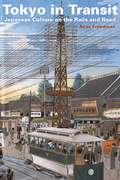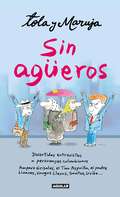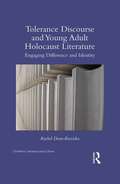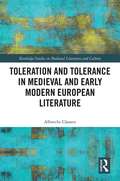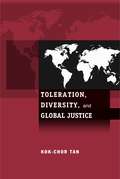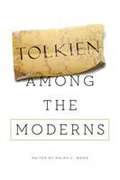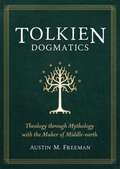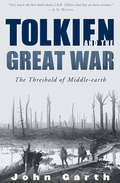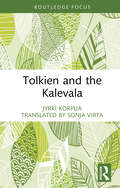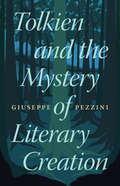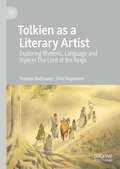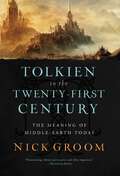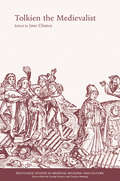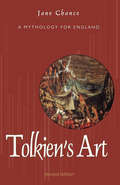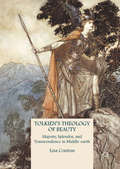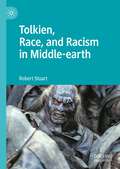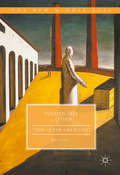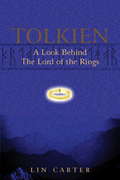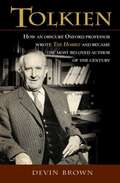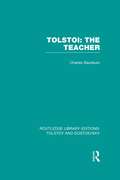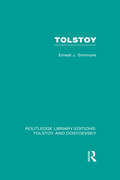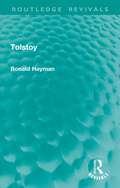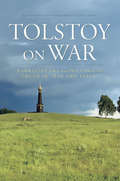- Table View
- List View
Tokyo in Transit: Japanese Culture on the Rails and Road
by Alisa FreedmanIncreased use of mass transportation in the early twentieth century enabled men and women of different social classes to interact in ways they had not before. Using a cultural studies approach that combines historical research and literary analysis, author Alisa Freedman investigates fictional, journalistic, and popular culture depictions of how mass transportation changed prewar Tokyo's social fabric and artistic movements, giving rise to gender roles that have come to characterize modern Japan. Freedman persuasively argues that, through descriptions of trains and buses, stations, transport workers, and passengers, Japanese authors responded to contradictions in Tokyo's urban modernity and exposed the effects of rapid change on the individual. She shines a light on how prewar transport culture anticipates what is fascinating and frustrating about Tokyo today, providing insight into how people make themselves at home in the city. An approachable and enjoyable book, Tokyo in Transit offers an exciting ride through modern Japanese literature and culture, and includes the first English translation of Kawabata Yasunari's The Corpse Introducer, a 1929 crime novella that presents an important new side of its Nobel Prizewinning author.
Tola y Maruja: sin agueros
by Tola Y MarujaTola y Maruja han vuelto dispuestas a no dejar títere con cabeza en estas divertidas entrevistas. Durante casi tres décadas estas simpáticas tías paisas han cotilleado agarradas del brazo sobre lo divino y lo humano, solo por el placer de comadrear. Aquí hablan sin pelos en la lengua con veintiocho personajes colombianos de la farándula, el deporte, el periodismo, la música, la política, y les hacen las preguntas que solo a ellas se les ocurrirían -y que solo a ellas se les permitiría hacer-, no sin intrometerse con sus propias opiniones. Desde cuestionar la fidelidad de Santos a su exjefe, Uribe, hasta la ira de Amparo Grisales provocada por la irreverencia de las ancianas, en estas divertidas entrevistas no dejan títere con cabeza.
Tolerance Discourse and Young Adult Holocaust Literature: Engaging Difference and Identity (Children's Literature and Culture)
by Rachel Dean-RuzickaWhat, exactly, does one mean when idealizing tolerance as a solution to cultural conflict? This book examines a wide range of young adult texts, both fiction and memoir, representing the experiences of young adults during WWII and the Holocaust. Author Rachel Dean-Ruzicka argues for a progressive reading of this literature. Tolerance Discourse and Young Adult Holocaust Literature contests the modern discourse of tolerance, encouraging educators and readers to more deeply engage with difference and identity when studying Holocaust texts. Young adult Holocaust literature is an important nexus for examining issues of identity and difference because it directly confronts systems of power, privilege, and personhood. The text delves into the wealth of material available and examines over forty books written for young readers on the Holocaust and, in the last chapter, neo-Nazism. The book also looks at representations of non-Jewish victims, such as the Romani, the disabled, and homosexuals. In addition to critical analysis of the texts, each chapter reads the discourses of tolerance and cosmopolitanism against present-day cultural contexts: ongoing debates regarding multicultural education, gay and lesbian rights, and neo-Nazi activities. The book addresses essential questions of tolerance and toleration that have not been otherwise considered in Holocaust studies or cultural studies of children’s literature.
Toleration and Tolerance in Medieval European Literature
by Albrecht ClassenToleration and Tolerance in Medieval European Literature aims to examine and unearth the critical investigations of toleration and tolerance presented in literary texts of the Middle Ages. In contrast to previous approaches, this volume identifies new methods of interpreting conventional classifications of toleration and tolerance through the emergence of multi-level voices in literary, religious, and philosophical discourses of authorities in medieval literature. Accordingly, this volume identifies two separate definitions of toleration and tolerance, the former as a representative of a majority group accepts a member of the minority group but still holds firmly to the believe that s/he is right and the other entirely wrong, and tolerance meaning that all faiths, convictions, and ideologies are treated equally, and the majority speaker is ready to accept that potentially his/her position is wrong. Applying these distinct differences in the critical investigation of interaction and representation in context, this book offers new insight into the tolerant attitudes portrayed in medieval literature of which regularly appealed, influenced and shaped popular opinions of the period.
Toleration, Diversity, and Global Justice (G - Reference, Information and Interdisciplinary Subjects)
by Kok-Chor TanThe "comprehensive liberalism" defended in this book offers an alternative to the narrower "political liberalism" associated with the writings of John Rawls. By arguing against making tolerance as fundamental a value as individual autonomy, and extending the reach of liberalism to global society, it opens the way for dealing more adequately with problems of human rights and economic inequality in a world of cultural pluralism.
Tolkien Among The Moderns
by Ralph C. WoodIt has long been recognized that J. R. R. Tolkien’s work is animated by a profound moral and religious vision. It is less clear that Tolkien’s vision confronts the leading philosophical and literary concerns addressed by modern writers and thinkers. This book seeks to resolve such uncertainty. It places modern writers and modern quandaries in lively engagement with the broad range of Tolkien’s work, while giving special attention to the textual particularities of his masterpiece, The Lord of the Rings. In ways at once provocative and original, the contributors deal with major modern artists and philosophers, including Miguel de Cervantes, Friedrich Nietzsche, Emmanuel Levinas, Iris Murdoch, and James Joyce. The essays in Tolkien among the Moderns also point forward to postmodernism by examining its implications for Tolkien’s work. Looking backward, they show how Tolkien addresses two ancient questions: the problems of fate and freedom in a seemingly random universe, as well as Plato’s objection that art can neither depict truth nor underwrite morality. The volume is premised on the firm conviction that Tolkien is not a writer who will be soon surpassed and forgotten―exactly because he has a permanent dwelling place “among the moderns.”
Tolkien Dogmatics: Theology through Mythology with the Maker of Middle-earth
by Austin M. FreemanTheology through mythology J. R. R. Tolkien was many things: English Catholic, father and husband, survivor of two world wars, Oxford professor, and author. But he was also a theologian. Tolkien's writings exhibit a coherent theology of God and his works, but Tolkien did not present his views with systematic arguments. Rather, he expressed theology through story. In Tolkien Dogmatics, Austin M. Freeman inspects Tolkien's entire corpus— The Hobbit, The Lord of the Rings, and beyond—as a window into his theology. In his stories, lectures, and letters, Tolkien creatively and carefully engaged with his Christian faith. Tolkien Dogmatics is a comprehensive manual of Tolkien's theological thought arranged in traditional systematic theology categories, with sections on God, revelation, creation, evil, Christ and salvation, the church, and last things. Through Tolkien's imagination, we reencounter our faith.
Tolkien and the Great War: The Threshold of Middle-earth
by John GarthHow the First World War influenced the author of the Lord of the Rings Trilogy: &“Very much the best book about J.R.R. Tolkien that has yet been written.&” —A. N. Wilson As Europe plunged into World War I, J. R. R. Tolkien was a student at Oxford and part of a cohort of literary-minded friends who had wide-ranging conversations in their Tea Club and Barrovian Society. After finishing his degree, Tolkien experienced the horrors of the Great War as a signal officer in the Battle of the Somme, where two of those school friends died. All the while, he was hard at work on an original mythology that would become the basis of his literary masterpiece, the Lord of the Rings trilogy. In this biographical study, drawn in part from Tolkien&’s personal wartime papers, John Garth traces the development of the author&’s work during this critical period. He shows how the deaths of two comrades compelled Tolkien to pursue the dream they had shared, and argues that the young man used his imagination not to escape from reality—but to transform the cataclysm of his generation. While Tolkien&’s contemporaries surrendered to disillusionment, he kept enchantment alive, reshaping an entire literary tradition into a form that resonates to this day. &“Garth&’s fine study should have a major audience among serious students of Tolkien.&” —Publishers Weekly &“A highly intelligent book . . . Garth displays impressive skills both as researcher and writer.&” —Max Hastings, author of The Secret War &“Somewhere, I think, Tolkien is nodding in appreciation.&” —San Jose Mercury News &“A labour of love in which journalist Garth combines a newsman&’s nose for a good story with a scholar&’s scrupulous attention to detail . . . Brilliantly argued.&” —Daily Mail (UK) &“Gripping from start to finish and offers important new insights.&” —Library Journal &“Insight into how a writer turned academia into art, how deeply friendship supports and wounds us, and how the death and disillusionment that characterized World War I inspired Tolkien&’s lush saga.&” —Detroit Free Press
Tolkien and the Kalevala (Routledge Focus on Literature)
by Jyrki KorpuaThis book explores J. R. R. Tolkien’s unique and warm relationship to the Kalevala, a poem usually hailed as the Finnish and Karelian national epic, compiled, edited and partly revisioned from older folk poetry by Finnish scholar Elias Lönnrot in the 19th century. J. R. R. Tolkien, an Oxford academic and the greatest author of the 20th-century fantasy, creator of The Hobbit and The Lord of the Rings, was fascinated from early on by the Kalevala. Tolkien himself described the Kalevala as “a germ” of his fantasy fiction.
Tolkien and the Mystery of Literary Creation
by Giuseppe PezziniTaking his readers into the depths of a majestic and expansive literary world, one to which he brings fresh illumination as if to the darkness of Khazad-dûm, Giuseppe Pezzini combines rigorous scholarship with an engaging style to reveal the full scale of J. R. R. Tolkien's vision of the 'mystery of literary creation'. Through fragments garnered from across a scattered body of writing, and acute readings of primary texts (some well-known, others less familiar or recently published), the author divulges the unparalleled complexity of Tolkien's work while demonstrating its rich exploration of literature's very nature and purpose. Eschewing any overemphasis on context or comparisons, Pezzini offers rather a uniquely sustained, focused engagement with Tolkien and his 'theory' on their own terms. He helps us discover – or rediscover – a fascination for Tolkien's literary accomplishment while correcting long-standing biases against its nature and merits that have persisted fifty years after his death.
Tolkien as a Literary Artist: Exploring Rhetoric, Language and Style in The Lord of the Rings
by Dirk Siepmann Thomas KullmannThis book takes a fresh look at Tolkien’s literary artistry from the points of view of both linguistics and literary history, with the aim of shedding light on the literary techniques used in The Lord of the Rings. The authors study Tolkien’s use of words, style, narrative techniques, rhetoric and symbolism to highlight his status as literary artist. Dirk Siepmann uses a corpus stylistic approach to analyse Tolkien’s vocabulary and syntax, while Thomas Kullmann uses discourse theory, literary history and concepts of intertextuality to explore Tolkien’s literary techniques, relating them to the history of English fiction and poetry. Issues discussed include point of view, speeches, story-telling, landscape descriptions, the poems inserted into the body of the narrative, and the role of language in the characterization of the novel’s protagonists. This book will be of particular interest to students and scholars of literature, corpus linguistics and stylistics, as well as Tolkien fans and specialists.
Tolkien in the Twenty-First Century: The Meaning of Middle-Earth Today
by Nick GroomAn original and thought-provoking reassessment of J. R. R. Tolkien&’s world, revealing how his visionary creation of Middle-Earth is more relevant now than ever before. What is it about Middle-Earth and its inhabitants that has captured the imagination of millions of people around the world? And why does Tolkien's visionary creation continue to fascinate and inspire us eighty-five years after its first publication? Beginning with Tolkien's earliest influence—and drawing on key moments from his life, Tolkien in the Twenty-First Century is an engaging and vibrant reinterpretation of the beloved author's work. Not only does it trace the genesis and inspiration for the original books, but the narrative also explores the later film and literary adaptations that have cemented his reputation as a cultural phenomenon. Delving deep into topics such as friendship, failure, the environment, diversity, and Tolkien's place in a post-Covid age, Nick Groom takes us on an unexpected journey through Tolkien's world, revealing how it is more relevant now than perhaps Tolkien himself ever envisioned.
Tolkien the Medievalist (Routledge Studies in Medieval Religion and Culture #Vol. 3)
by Jane ChanceInterdisciplinary in approach, Tolkien the Medievalist provides a fresh perspective on J. R. R. Tolkien's Medievalism. In fifteen essays, eminent scholars and new voices explore how Professor Tolkien responded to a modern age of crisis - historical, academic and personal - by adapting his scholarship on medieval literature to his own personal voice. The four sections reveal the author influenced by his profession, religious faith and important issues of the time; by his relationships with other medievalists; by the medieval sources that he read and taught, and by his own medieval mythologizing.
Tolkien's Art: A Mythology for England
by Jane ChanceThis literary study examines the scholarly and mythological roots of the author’s beloved stories, including The Hobbit and The Lord of the Rings.J.R.R. Tolkien captured the imaginations of generations with his expansive fantasy worlds and tales of high adventure. But Tolkien was also an accomplished scholar whose deep knowledge of mythology and language provided a wellspring of inspiration for his fiction. In this enlightening study, Tolkien specialist Jane Chance uncovers the many sources the author used in composing his works.Inspired by works like Beowulf and Gawain and the Green Knight, Tolkien relied on both pagan epic and Christian legend to create a distinctly English mythology. Chance traces this project through his major works as well as his minor stories and critical essays. This revised and expanded edition also examines the paradigm of the critic as monster featured in many of Tolkien’s writings.
Tolkien's Theology of Beauty
by Lisa CoutrasIn this book, Lisa Coutras explores the structure and complexity of J. R. R. Tolkien's narrative theology, synthesizing his Christian worldview with his creative imagination. She illustrates how, within the framework of a theological aesthetics, transcendental beauty is the unifying principle that integrates all aspects of Tolkien's writing, from pagan despair to Christian joy. J. R. R. Tolkien's Christianity is often held in an unsteady tension with the pagan despair of his mythic world. Some critics portray these as incompatible, while Christian analysis tends to oversimplify the presence of religious symbolism. This polarity of opinion testifies to the need for a unifying interpretive lens. The fact that Tolkien saw his own writing as "religious" and "Catholic," yet was preoccupied with pagan mythology, nature, language, and evil, suggests that these areas were wholly integrated with his Christian worldview. Tolkien's Theology of Beauty examines six structural elements, demonstrating that the author's Christianity is deeply embedded in the narrative framework of his creative imagination.
Tolkien, Race, and Racism in Middle-earth
by Robert StuartTolkien, Race, and Racism in Middle-earth is the first systematic examination of how Tolkien understood racial issues, how race manifests in his oeuvre, and how race in Middle-earth, his imaginary realm, has been understood, criticized, and appropriated by others. This book presents an analysis of Tolkien’s works for conceptions of race, both racist and anti-racist. It begins by demonstrating that Tolkien was a racialist, in that his mythology is established on the basis of different races with different characteristics, and then poses the key question “Was Tolkien racist?” Robert Stuart engages the discourse and research associated with the ways in which racism and anti-racism relate Tolkien to his fascist and imperialist contemporaries and to twenty-first-century neo-Nazis and White Supremacists—including White Supremacy, genocide, blood-and-soil philology, anti-Semitism, and aristocratic racism. Addressing a major gap in the field of Tolkien studies, Stuart focuses on race, racisms and the Tolkien legendarium.
Tolkien, Self and Other
by Jane ChanceThis book examines key points of J. R. R. Tolkien's life and writing career in relation to his views on humanism and feminism, particularly his sympathy for and toleration of those who are different, deemed unimportant, or marginalized--namely, the Other. Jane Chance argues such empathy derived from a variety of causes ranging from the loss of his parents during his early life to a consciousness of the injustice and violence in both World Wars. As a result of his obligation to research and publish in his field and propelled by his sense of abjection and diminution of self, Tolkien concealed aspects of the personal in relatively consistent ways in his medieval adaptations, lectures, essays, and translations, many only recently published. These scholarly writings blend with and relate to his fictional writings in various ways depending on the moment at which he began teaching, translating, or editing a specific medieval work and, simultaneously, composing a specific poem, fantasy, or fairy-story. What Tolkien read and studied from the time before and during his college days at Exeter and continued researching until he died opens a door into understanding how he uniquely interpreted and repurposed the medieval in constructing fantasy.
Tolkien: A Biography
by Humphrey CarpenterDrawing on many sources, including friends, children and grandchildren, writings both published and unpublished by Professor Tolkien, Carpenter gives a detailed picture of the life of J. R. R. Tolkien, distinguished scholar and author most widely known for The Hobbit and The Lord of the Rings. He describes his childhood in South Africa, the years at King Edward's school in Birmingham, his meeting and romance with his future wife, Edith Bratt, his undergraduate years at Oxford, and experiences in World War I. In subsequent chapters, Carpenter describes Tolkien's work on the New English dictionary, his brief tenure at Leeds University and return to Oxford as Professor of Anglo-Saxon and later of English Language and Literature until his retirement in 1959. The author discusses his collaborations with various colleagues on academic works and his writing of many imaginative stories for his children and his own amusement, including The Hobbit. Carpenter describes Tolkien's close friendship with C. S. Lewis and the circumstances that later lead to its waning. He relates the lengthy history of the writing of The Lord of the rings and its complicated publishing history. Finally, he discusses the success of the book and how it affected Tolkien's life. The book ends with a chronology of events, a complete list of the published works of Tolkien up to 1977, a simplified genealogical chart and an index.
Tolkien: A Look Behind The Lord Of The Rings
by Lin CarterLin Carter introduces readers to Tolkien's epic trilogy then takes them on a scholarly yet populist journey through the massive web of myths and legends that Tolkien drew on for both imagery and themes during his life's work. Carter's book places Tolkien's trilogy in the context of world mythology and legend and is a tribute to Tolkiens power of assimilation and original vision. It is the ideal introduction to the background of the LORD OF THE RINGS for the legions of new fans.
Tolkien: How an Obscure Oxford Professor Wrote The Hobbit and Became the Most Beloved Author of the Century
by Devin BrownJ.R.R. Tolkien transformed his love for arcane linguistic studies into a fantastic world of Middle Earth, a world of filled with characters that readers the world over have loved and learned from for generations.Devin Brown focuses on the story behind how Tolkien became one of the best-known writers in the history of literature, a tale as fascinating and as inspiring as any of the fictional ones he would go on to write. Weaving in the major aspects of the author’s life, career, and faith, Brown shares how Tolkien’s beloved works came to be written.With a third follow-up film and the book’s release the same month, there’s a large interest in the faith values for these works. This book addresses that deep hunger to know what fuels the world and worldview of The Hobbit’s celebrated author, Tolkien.
Tolstoi: The Teacher (Routledge Library Editions: Tolstoy and Dostoevsky)
by Charles-BaudouinThe author states here that Tolstoy was a great educator and his views on education were ingenious and profound. Despite being a great artist, Tolstoy also had pedagogic method and drew abundantly on the stores of science. The book looks at articles which Tolstoy wrote on education and childhood, comparing him frequently to Rousseau, and also outlines the influences of his travels which informed his knowledge of contemporary schooling. The conclusion considers the development of Tolstoy’s thought on teaching alongside the state of education at the time the book was first published, in 1923. This will be of interest for the educational historian as well as those interested in Tolstoy himself.
Tolstoy (Routledge Library Editions: Tolstoy and Dostoevsky)
by Ernest Joseph SimmonsTolstoy’s fame as one of the world’s greatest novelists has never been in doubt, but the importance of his views on the social, moral and religious issues of his time is not so widely recognised. This study, first published in 1973, presents an introduction to the historical and cultural background of Tolstoy’s lifetime, then going on to consider the major events of his developing personality as a writer and reformer. As well as considering the famous novels and literary criticism, Simmons treats his educational theories and practice, famine relief work, spiritual crises and religious, social and moral beliefs, as reflected in controversial writings such as What I Believe, What Then Must We Do? and The Kingdom of God Is Within You. He also investigates Tolstoy’s involvement in government, war and revolution, and the relevance of his reformist views in the contemporary world.
Tolstoy (Routledge Revivals)
by Ronald HaymanOriginally published in 1970, this account of Tolstoy’s achievement as a novelist concentrates on the best known of his works, in particular the two masterpieces Anna Karenina and War and Peace. Extracts are, however, taken from all the major novels and are arranged chronologically to demonstrate the development of his technique. The main part of the book is concerned with narrative method and analyses Tolstoy’s treatment of character, landscape and dialogue together with his use of satire and irony. The range of subject matter throughout the novels is then discussed. In this way, Tolstoy’s genius is seen to lie in his unique gift for penetrating deeply into the individual lives of his characters and at the same time embracing their actions within a complete framework of social and political life.
Tolstoy On War
by Donna Tussing Orwin Rick McpeakIn 1812, Napoleon launched his fateful invasion of Russia. Five decades later, Leo Tolstoy published War and Peace, a fictional representation of the era that is one of the most celebrated novels in world literature. The novel contains a coherent (though much disputed) philosophy of history and portrays the history and military strategy of its time in a manner that offers lessons for the soldiers of today. To mark the two hundredth anniversary of the French invasion of Russia and acknowledge the importance of Tolstoy's novel for our historical memory of its central events, Rick McPeak and Donna Tussing Orwin have assembled a distinguished group of scholars from diverse disciplinary backgrounds-literary criticism, history, social science, and philosophy-to provide fresh readings of the novel. The essays in Tolstoy On War focus primarily on the novel's depictions of war and history, and the range of responses suggests that these remain inexhaustible topics of debate. The result is a volume that opens fruitful new avenues of understanding War and Peace while providing a range of perspectives and interpretations without parallel in the vast literature on the novel. Contributors: Alan Forrest, University of York; Andreas Herberg-Rothe, University of Applied Sciences, Fulda, Germany; Dominic Lieven, Trinity College, Cambridge University; Jeff Love, Clemson University; Alexander M. Martin, University of Notre Dame; Rick McPeak, United States Military Academy at West Point; Gary Saul Morson, Northwestern University;Donna Tussing Orwin, University of Toronto; Elizabeth D. Samet, United States Military Academy at West Point; Dan Ungurianu, Vassar College; David A. Welch, Balsillie School of International Affairs and University of Waterloo
